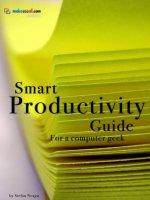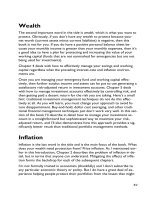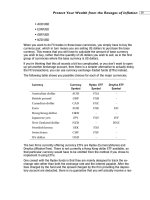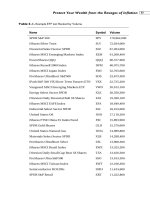The Smart Productivity Guide for the Computer Geek
Bạn đang xem bản rút gọn của tài liệu. Xem và tải ngay bản đầy đủ của tài liệu tại đây (1.2 MB, 34 trang )
The Smart Productivity
Guide for the
Computer Geek
By Stefan Neagu
Edited by Justin Pot
This manual is the intellectual property of
MakeUseOf. It must only be published in its
original form. Using parts or republishing altered
parts of this guide is prohibited without permission
from MakeUseOf.com
Think you’ve got what it takes to write a manual
for MakeUseOf.com? We’re always willing to
hear a pitch! Send your ideas to
; you might earn up to
$400.
Table of Contents
Introduction
Concentration
Productivity Mistakes
Coffee: Good or Bad?
Improve your typing skills
Setting Up Your Workspace
Scheduling
Motivation
Essential Tools
MakeUseOf
Introduction
Why an eBook about Productivity?
Every day of our lives, sometimes even on
weekends, we have to work. And because many of
us can’t keep up with the increasingly faster pace
of life, our ability to interact with other people and
spend time with family and friends is greatly
reduced. This, unfortunately, can lead to big
problems, and it is extremely important to learn
how to maintain a balance between work and
everything else.
And how can you keep both sides happy? Being
productive means you finish your work faster and
get more time for yourself, family, friends and
hobbies. It means you’ll be relaxed and ready for a
new day. The gratification of a job well done is
also not to be forgotten, and your boss will surely
notice the improvement.
In this eBook we’re going to cover some tips for
becoming more productive in this new world -
where distractions await at every computer or
portable device. Everything in this eBook is from
my own experience, balancing time allocated for
school work, a part-time job as a writer, my
girlfriend and my other friends. Believe me; it’s
extremely easy to fall into extremes.
Concentration
The internet, while it’s a huge resource for
information, and a great productivity tool which
enables collaboration between peers around the
world or cubicle, it’s an incredibly huge time
waster. And believe it or not, everyone is plagued
by this, from system administrators surfing the web
aimlessly using StumbleUpon, to programmers
reading Wired stories and photographers playing
with Google’s image matching website.
Even people who love their jobs sometimes find it
necessary to focus on non-job-related activities.
However, most employers either don’t know or
choose to ignore that a good portion of the day is
wasted. Recent research shows that HR
professionals assume that employees will waste
around 1 hour each day. Employees admitted to
wasting around two hours a day.
It’s hard to decide who is affected most by this
behavior. On one hand, the employer pays for zero
productivity work hours. On the other hand the
employee might get the boot if he continues
wasting time. In the grand scheme of things, it is
believed that the economy loses around 11 billion
pounds every year in the United Kingdom.
If you need to get work done, turn off the internet.
If you know you can’t resist opening the browser,
even for a short flash game, remove the Ethernet
cable or disconnect from the wireless network.
Sometimes, all it takes me to get started writing is
just switching off the computer and working with a
pen and a piece of paper, writing what I think;
without the ability to go fact checking some other
thing or an IM window popping up.
Turn off the TV, radio, iPod, Xbox, blinking lights
and hide the PSP. If you need to take a break, don’t
play Max Payne and instead go to the window or
outside and grab some fresh air for 5 minutes.
Productivity Mistakes
You wouldn’t believe how many mistakes you can
make when it comes to productivity. Some of them
can turn to full-blown catastrophes. Like you, I
encounter these types of situations daily, be it at
school, at home or working as a part-time writer.
The worst mistake you can make is losing your
temper with your peers, and especially people
higher in the hierarchy. Even if the demand sounds
absurd, unacceptable or impossible to accomplish,
you shouldn’t have a nervous breakdown. Instead
take out a piece of paper and create a logical
argument that stands by your position. Afterwards,
present it to same peer, or if that doesn’t work,
directly to the boss. If that doesn’t work, there’s
always plan B: do whatever you can and present
the result. Doing nothing or starting screaming is
not going to help anyone. If you’re expected to
produce 500 words out of a 5 word sentence – just
because – sit down in front of the computer, pour
some coffee, brainstorm ideas and don’t stop until
you’re at least at 400 words. Analyze, deconstruct,
give examples, launch your own opinion, and even
digress on something interesting. That’s what I do.
Image courtesy of XKCD
The second worst thing you can do is waste time.
There’s always something you can do – watching
leafs move doesn’t count. If you’re done with a
project and still have time on the clock, start on the
next one, read a book or ask your boss to leave you
to go home. Time is something you can’t get back,
so why would you want to waste it? Clean your
desk, help a colleague, have a conversation with
that girl in the next cubicle – just don’t watch old
Simpson episodes on Hulu.
Which brings us to the biggest productivity killer
ever invented – the Internet. Facebook, Twitter,
YouTube and the list goes on and on. The number
of places you can visit on the internet is ever
increasing and the tools that help you waste time,
always updated.
StumbleUpon, Delicious, Digg, Reddit, all want
your attention and energy. You should have the
strength within you to abstain.
If you can’t use the Force, like Luke Skywalker, I
recommend you use the following instructions to
edit your hosts file. By adding a simple line to this
file you will be effectively unable to access the
website you desire while still being able to access
anything else relevant to your research. When you
want access back – just delete the line.
• Navigate to
%SystemRoot%\system32\drivers\etc\. For
other operating systems, locations of the hosts file
are available on Wikipedia.
• Open the file names hosts using WordPad.
• For example, add to the end of the document
“127.0.0.1 facebook.com”. This will redirect any
requests for Facebook back to the loopback
adapter – your own computer instead of the server.
A blank page will appear instead of Facebook.
• Save and click OK on the UAC prompt.
Another thing you might want to try if you check
your email every 30 seconds is the Email Addict
add-on available for Gmail. Click on the green
icon on the top right of your window and scroll
down to find it.
There’s also a great add-on for Firefox that
“blocks those time-wasting sites that can suck the
life out of your working day. All you need to do is
specify which sites to block and when to block
them.” Read more about LeechBlock here.
The above link point to our article on "5 Tools to
Track How Much Time you Waste while Online".
In the same post there is another useful addon to
monitor your internet usage, it's called MeeTimer.
It will also warn you when you try to open a new
tab or link.
Finally there a program called ManicTime that
keeps detailed stats on everything you do when
working on your computer. It can help you
understand where does your time go, how much of
it is wasted and what is that distracting you most.
Check out ManicTime.
If you’re looking for an add-on to monitor your
internet usage, check out MeeTimer. It will also
warn you when you try to open a new tab or link.
Lastly, it’s of outmost importance to have a
balance between work, family and fun, and the best
way to achieve that is to separate the activities
accordingly. Doing math while listening to
Nightwish doesn’t work, and adding a beer to that
equation is equally disastrous. Instead, organize
your morning so you finish work in time, work and
then enjoy some quality time with friends.
Coffee: Good or Bad?
Is going for coffee affecting productivity? Some
say it does, citing the time it takes to run out of the
office and get back as well as the cost – not exactly
pennies for Starbucks. It can also interrupt your
work flow - killing any momentum you had before
you left.
Photo credit: Wikipedia Commons.
On the other hand, clearing your mind for a bit can
help you see what you are missing and ultimately
help you find a solution. The trip for coffee can
also be a routine, which is okay if you’re used to
getting to work after.
There are conflicting studies regarding the health
impact of coffee and its relation to productivity.
Studies funded by mineral water companies say it
increases anxiety and because caffeine is a
diuretic, it increases the number of times you have
to go to the bathroom – leaving your desk.
Caffeine is a stimulant, having the effect of
temporarily warding off drowsiness and restoring
alertness. Various beverages containing caffeine,
such as coffee, tea, soft drinks and energy drinks
are very popular. Caffeine is the world's most
widely consumed psychoactive substance but
unlike many other psychoactive substances it is
legal and unregulated in nearly all jurisdictions. In
North America, 90% of adults consume caffeine
daily. The U.S. Food and Drug Administration lists
caffeine as a "Multiple Purpose Generally
Recognized as Safe Food Substance".
From my own experience I can say that coffee
helps me concentrate. After I drink my mug, I’m
ready to start working. I actually can’t sit and do
nothing after I drink my coffee – I feel like I need
to do something. However, drinking more than 3
cups has a disastrous effect. I lose focus,
concentration and get easily irritated by every
mistake I make. Balance, like in all things, is the
key.
Improve your typing skills
For many, touch typing (typing without looking at
the keys) is a skill learned long ago on an IBM
Selectric or Apple IIe, but its importance is often
overlooked. Many of us, though, still employ the
self-taught, “hunt-and-peck” approach, finding keys
using our own unique methods. While this
approach might get the job done, it doesn’t achieve
the same speed or ease of typing that touch typing
offers. Knowing how to touch type can free your
mind to focus on the writing task at hand, rather
than hunting for keys, and lets you compose emails,
reports, and memos more quickly. Learning to
touch type can greatly increase your productivity.
Photo credit: opie
A typing speed of 40-60 words per minute (wpm),
about 3-4 times faster than an average handwriting
speed, is a common workplace standard. Some
employers hiring for positions that involve a good
deal of typing require even higher speeds.
Accuracy, too, is important in speedy and effective
typing—the fewer mistakes you make, the less time
you have to spend correcting your work.
Check out following articles reviewing different
websites and programs helping you to practice
your typing skills and learn touch typing.
Learn Touch Typing (both web and
desktop apps)
• TypingWeb
• Keybr
• Bruce's Touch Typing Wizard
Practice Touch Typing
• 10 Fast Fingers
• TypeRacer
•Typing Games
Setting Up Your Workspace
It is extremely important to avoid awkward
postures and position your body comfortably. Not
only can this improve your overall productivity, it
may help you avoid various diseases caused by
extended use of computers (MSDs).
Photo credit: lactose
• While behind a desk you should consider
following these rules:
• Use a chair that supports your lower back.
• Place your keyboard and mouse at elbow level.
• Adjust your work surface and chair height to
assume a comfortable position.
• Position the top of the screen at eye level.
• Use a footrest if your feet aren’t comfortable
directly on the floor.
Having a good place to work can play a huge role
in increasing productivity. There are many types of
people, some like to have everything on the desk,
others prefer everything tucked neatly out of sight.
I, for one, prefer having lot of things on my desk.
Most of the things I need to work with are in close
reach this way.
Messy desks can provide inspiration – especially
for writers – but they can also be distracting for a
programmer. He might only want a coffee mug and
a stress ball. Whatever you end up deciding with,
make sure the environment in which you are
working is comfortable and suits your personal
tastes.
Scheduling
In order to get things done I’ve found that to-do
lists and schedules –even self-imposed – can be an
invaluable resource. On a piece of paper, notebook
or sticky note, write everything you need to
accomplish. Next to each item, set an arbitrary date
at which you want to finish that assignment. If the
first time all your tasks are jumbled, you can now
copy the tasks onto another piece of paper in order.
Photo credit: Only One Thing
Keep that schedule on the desk, input it into
Outlook or Google Calendar, but try to stick to it
no matter what. Imagine you are your boss and you
must complete the task at the specified time. This
method works miracles – even if I’m tired after a









